To build a successful website, you need to start with a solid foundation—a reliable and reputable web hosting provider. Without one, you risk excessive downtime, slow page loading speeds, and even security threats.
This guide introduces and makes a side-by-side comparison of two of the most popular web hosts. Read on to discover the right web host for your unique needs.
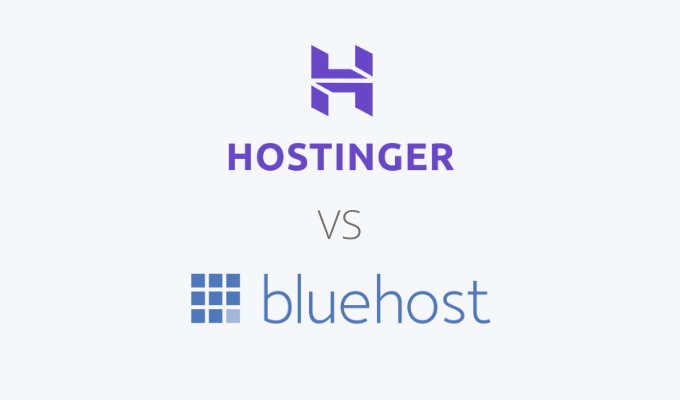
Hostinger vs. Bluehost High-Level Comparison
Bluehost stand out for a few reasons: its guided onboarding is perfect for those new to website management, especially anyone using WordPress to build and run their sites, and it has built a very beginner-friendly platform and fine-tuned it for WordPress to make things as smooth as possible.
Bluehost keeps beginners in mind with its user interface, too. Tackling a task for the first time? Bluehost will usually walk you through it, so doing things like setting up an email account or starting a blog isn’t a guessing game for you. Bluehost also keeps prices on the low side, making it affordable to get started.
Hostinger stands out for two reasons: it provides dependable web hosting and does it at a really low long-term cost. It also offers a few other outstanding features that make it the ideal solution for those who prefer to outsource the behind-the-scenes tasks that go with running a website.
Hostinger offers free backups with all shared hosting plans so that your site can be quickly restored in the event of a major problem. Most other hosting services charge extra for this peace-of-mind feature. Hostinger also gives you a simplified control panel—aptly called hPanel—with simple navigation icons, making it easy to find what you need, even for first-time website owners.
Both Hostinger and Bluehost are in the top four of our recommended web hosting providers. While both services work no matter which platform you build your website on, WordPress-built sites are the sweet spot for both. And that’s where Bluehost really shines.
Products and Services Offered By Hostinger and Bluehost
As major web hosting providers, both Hostinger and Bluehost offer very similar shared hosting services. They both offer multiple plans, free SSL certificates, and a free domain name for the first year. Bluehost is one of three preferred WordPress hosting providers. Hostinger offers a dedicated WordPress dashboard, so running WordPress sites on either platform is streamlined.
Hostinger boasts some impressive speeds for a low-price web hosting provider. Usually, you sacrifice one for the other, but not with Hostinger. The industry average for page loading speed is around 900 ms and Hostinger halves that number to an average of about 300-400 ms.
Hostinger also gives you its website builder for free when you sign up for web hosting. The Hostinger website builder is extremely easy to use and consistently makes our top list of the best website builders. This extra functionality can be a valuable benefit. Take a deeper dive into Hostinger in our full review.
Bluehost focuses on making website hosting as easy as possible. Even beginners at website administration find Bluehost’s user interface intuitive and straightforward. Bluehost also throws in some valuable marketing credits for Google Ads and makes it simple to set up your Google My Business account.
Bluehost is also a WordPress-preferred hosting provider. So if you’re going to build your website with WordPress, it makes sense to choose a provider recognized as one of the best by the source. You’ll even get customized WordPress themes with all Bluehost plans. Discover more about Bluehost in our comprehensive review.
Company Health and Stability of Hostinger and Bluehost
Hostinger and Bluehost each have decades of web hosting expertise. In fact, they both started at about the same time.
Hostinger is based in Lithuania and originally began as Hosting Media back in 2004. It was eventually rebranded to its current iteration in 2011. While they don’t disclose the total number of websites hosted, they do have over 1,000 employees in more than 54 countries today.
Provo, Utah-based Bluehost started in 2003 and currently claims to host over 2 million websites. It has more than 300 employees.
Both companies have great reputations and longevity in the space. Health and stability are not concerns for either, and we give both an A+.
Hostinger vs. Bluehost Pricing Comparison
Both companies focus on offering shared web hosting at affordable prices. Each breaks down its pricing on a per-month basis and entices longer-term commitments by offering cheaper monthly rates for multi-year agreements. You’ll have to commit to a longer-term contract and pay upfront to grab those lower prices, though.
As is typical in this industry, once renewal time rolls around, your monthly price will go up.
Hostinger lets you lock in pricing for 12, 36, or 48 months but also allows you to pay month-to-month. Bluehost gives you two choices, 12 or 36 months, and it does not offer monthly pay-as-you-go plans.
Both hosts give you a 30-day money-back guarantee to try out their services. If you’re unhappy, you’ll be refunded the web hosting costs. However, any extras you purchased are not included in the money-back guarantee.
Hostinger and Bluehost Pricing
Hostinger offers three shared web hosting plans—Single Web Hosting, Premium Web Hosting, and Business Web Hosting. You can choose a monthly, annual, 36-month, or 48-month plan period. The longer you commit, the lower the monthly price.
To get the lowest rate with Hostinger, you need to commit to a 48-month plan and pay in full upfront. When you do, you get Single Web Hosting for $1.99, Premium Web Hosting for $2.99, or Business Web Hosting for $3.99. All prices are per month, with payment in full at the start of your contract.
Hostinger offers a pay-by-the-month plan, but the rate jumps to a hefty $9.99 per month plus a $4.99 one-time setup fee. However, this may still be a great option if you have short-term website goals. Get all the details on Hostinger pricing.
Bluehost offers four shared hosting plans—Basic, Plus, Choice Plus, and Online Store. Contract duration is 12 or 36 months. You get the best introductory rate when you go with the 12-month commitment, but your renewal rate will be slightly higher than if you go with the 36-month plan.
Bluehost pricing is Basic for $2.75, Plus for $4.95, Choice Plus for $4.95, and Online Store for $9.95. All prices are per month with a 12-month contract, and you’ll need to pay in full when you sign up for service. At renewal, your monthly price will increase. Find out more about Bluehost pricing.
Cost Comparison of Hostinger and Bluehost
For anyone with simple web hosting needs for a single site, Hostinger is very cost-effective. You can get your site up and running for as low as $1.99 per month and lock that rate in for 48 months. Even at renewal, you’ll still only pay $3.99 per month, which is a pretty sweet deal. While you have to pay in full upfront, it is still one of the cheapest options to launch a new website.
To host a single site on Bluehost, you’ll have to go with its basic plan for 12 months to get the $2.75 per month rate. After your annual subscription expires, you’ll see a monthly renewal rate of $10.99. This is quite a price difference from Hostinger and may be too big of a jump for smaller websites with minimal needs.
However, Hostinger’s entry-level plan doesn’t come with a free domain for the first year. Bluehost does, and it’s less than $1 more per month. This is another reason why Bluehost has the edge for new websites.
If you’re looking to host multiple websites, Hostinger still offers a lower monthly cost. With its Premium Web Hosting plan, you can lock in a monthly rate of $2.99 for 48 months and get three months free. The renewal rate is $6.99 per month. These rates are for up to 100 websites. Hostinger’s shared hosting plans max out at 100 websites. You have to move to their Cloud or Professional hosting packages if you want to host more than 100 sites.
To host multiple sites on Bluehost, you need its Plus package, which starts at $4.95 per month for one year. After that, the renewal rate jumps to $14.99 per month. This price gives you unlimited websites, so if you plan to go big with the number of websites you run, Bluehost is the better option.
Trials and Guarantees for Hostinger and Bluehost
Both Hostinger and Bluehost give you 30 days to try out their services with no risk. Not happy? You can get a full refund for the web hosting costs you paid.
However, with Bluehost, the refund is only for hosting services. If you paid for extras like domain name registration, you can’t recoup those costs.
Hostinger also has some limitations on its money-back guarantee. Things like domain name renewals, privacy protection, and the SEO toolkit are not included.
Neither Hostinger nor Bluehost offers free trials, but the money-back guarantee gives you a full month to decide without much risk.
Hostinger vs. Bluehost Core Criteria Comparison
Our research put Bluehost on top for most of the key criteria important to anyone shopping for a new web hosting provider. Reliable site uptime, fast loading and page performance speeds, and advanced features are just a few of the ways Bluehost excels.
Hostinger also has its strengths. Most of those are related to keeping costs low. But even for such an affordable hosting solution, you’re still getting quality services. Hostinger is solid—just know that there will be a few tradeoffs for the lower price.
To find out how Hostinger and Bluehost stack up against their strongest competitors, dive into our top picks for website hosting.
Customer Support – Bluehost Wins
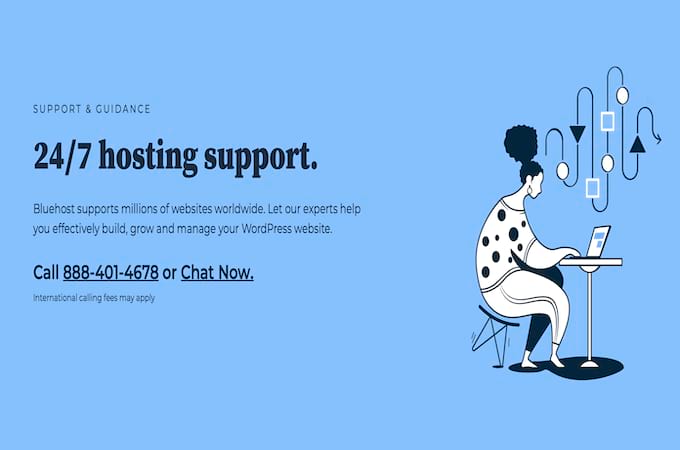
Bluehost offers 24/7 customer support via phone or chat. This means no matter where you are, you should be able to reach a live person anytime. Bluehost also provides a pretty robust knowledge base on its website. In it, you’ll find how-to guides, tutorials, FAQs, and troubleshooting articles to help you work out common issues on your own.
Hostinger also offers 24/7 customer support but explicitly does not include phone support. You can only reach them via chat or email. So if you prefer to talk to someone to work through your issues, you’re out of luck. Their website includes a knowledge base, tutorials, and a blog, plus you can access Hostinger Academy on YouTube.
Some users have complained about inconsistencies with Hostinger’s customer support, citing longer wait times and inconclusive responses.
Bluehost wins in the customer support category, as it goes the extra mile by offering 24/7 phone support.
Traffic Volume – Bluehost Wins
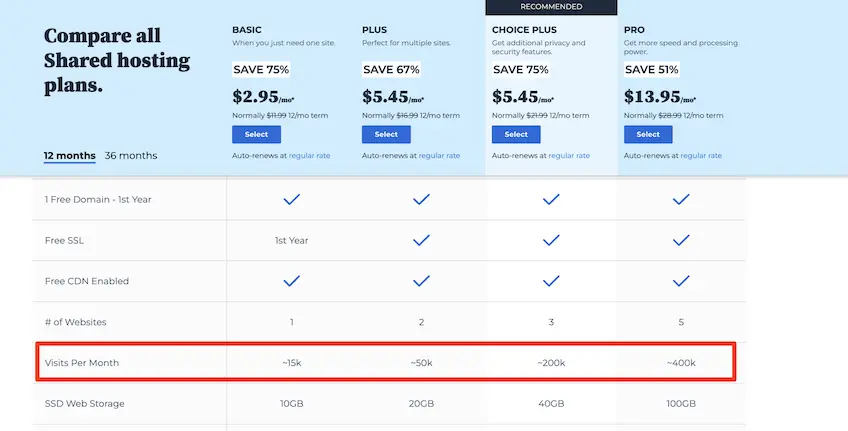
Bluehost is crystal clear about its approach to site traffic for each plan. The entry-level Basic plan can support roughly 15,000 visits per month. This is solid for new websites, and other providers typically support 10,000 visits at the entry level—so Bluehost already has an edge.
But what really makes Bluehost shine is the fact that it can support up to 400,000 monthly visits without having to leave shared hosting.
If you’re expecting high traffic from day one, you can even start with Bluehost’s Choice Plus plan. The new customer promotional rate is exactly the same as the Choice package, but it can handle double the traffic.
Hostinger does offer unmetered bandwidth on its shared plans. They also say that they won’t limit the number of visitors you get each month. However, unmetered bandwidth doesn’t actually translate to unlimited traffic. If you get a traffic spike, your visitors may experience slow loading speeds and poor performance. So it’s unclear exactly how much traffic the plans can actually handle.
Because of its straightforward approach to presenting this information, Bluehost wins this category.
Site Uptime – Hostinger Wins
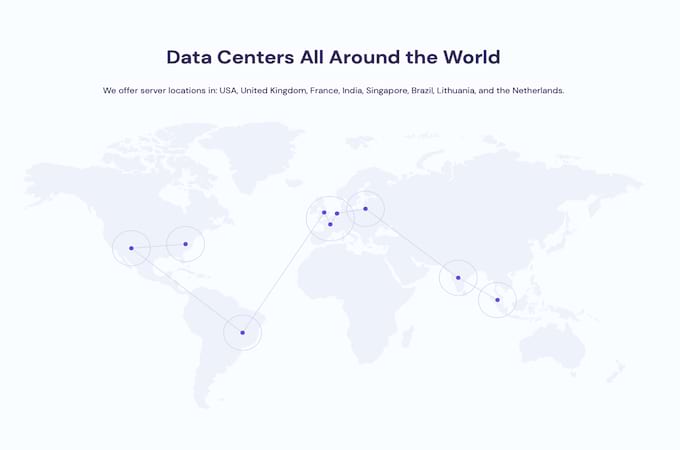
Hostinger guarantees a site uptime of 99.9%, meaning your site should be up virtually all the time. If you experience downtime, Hostinger will compensate you with a credit of 5% of your monthly hosting fee. However, there is some fine print.
Hostinger is the sole determiner of what constitutes site downtime. And if they do acknowledge a downtime experience in any given month, the 5% compensation you have to proactively ask for will be issued in the form of a future credit towards other Hostinger services. Luckily, Hostinger has an excellent reputation for uptime, so you probably won’t have to pursue a credit.
Bluehost advertises a 99.98% uptime rate, which is really good. However, its own Network Server Uptime Agreement waffles a bit and doesn’t mention this rate at all. Instead, Bluehost talks about downtime being normal and striving to fix most issues within 15 minutes, with some serious problems taking days.
Consumer review sites do have a fair number of users commenting about poor experiences with their websites being down for extended periods on Bluehost.
Despite Bluehost saying they have a higher uptime rate, Hostinger ultimately wins when it comes to site uptime.
Site Speed – Hostinger Wins
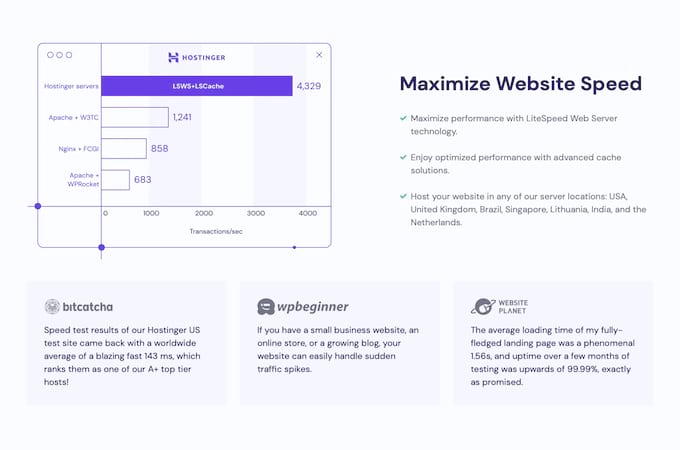
Hostinger offers some of the fastest site loading speeds, using SSD drives and optimized server deployments to achieve it. In our research team’s testing, we noted average page loading times of between 300-400 ms. This is about half the industry average.
Bluehost isn’t the worst for site loading speeds, but it doesn’t quite reach Hostinger levels of speed. Online sources note that Bluehost speed tests were not impressive, with an average page load time of 1107 ms, sometimes longer.
Bluehost doesn’t tout any special features or functionality related to speed on its website. However, they have an article about ways you can improve your site speed. They also include a free CDN in every web hosting package, which you can utilize to boost site speed.
Hostinger wins the site speed category.
WordPress Hosting – Bluehost Wins
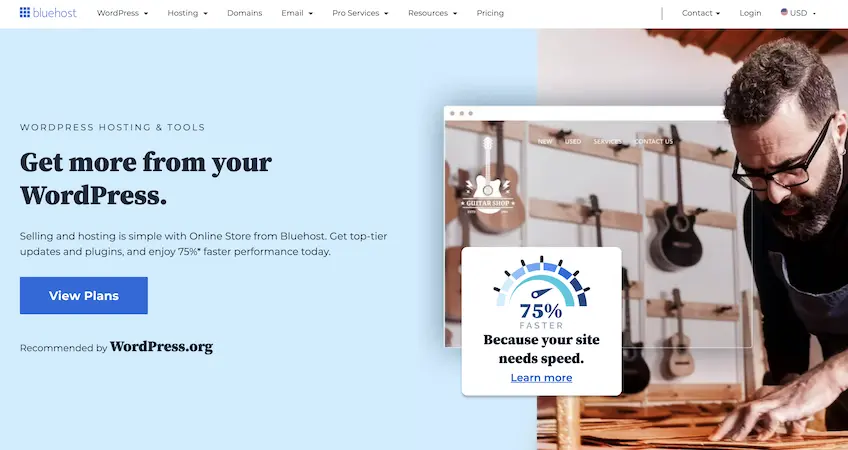
If you’re planning to power your website with WordPress (which we recommend), Bluehost has the edge over Hostinger.
All plans come with Bluehost WonderSuite, which is arguably the best tool on the market for setting up a new WordPress website. It streamlines your onboarding experience so you can build and launch your site in a matter of minutes. You’ll benefit from step-by-step guidance through the process and fully customizable tools that don’t require any technical experience.
Bluehost offers automatic WordPress installation, custom WordPress themes, access to WordPress Academy, and a free domain for one year with its WordPress hosting plans. In addition to the simple setup, you’ll also get automatic WordPress updates to ensure your site is secure and always performing at a high level.
Hostinger offers managed WordPress hosting for as low as $1.99 per month. You get all the same features of its shared hosting plans plus the convenience of managed hosting for the same cost.
Even though the service is managed, it still falls short in terms of the features when you compare it side-by-side with Bluehost.
It’s also worth noting that Bluehost is just one of three hosting providers recommended directly by WordPress. Hostinger is not on that list.
Overall, Bluehost wins when it comes to WordPress hosting.
Price – Hostinger Wins

Price is almost always a concern for those just starting out with their first (or second or third) website. Low monthly costs go hand-in-hand with small website budgets.
Hostinger offers the cheapest per-month rate for shared hosting, starting as low as $1.99 per month with a long-term commitment. It just doesn’t get cheaper than that. But you do have to commit to a four-year contract and pay in full upfront to claim this rate. Renewal pricing is $3.99 per month once your four-year commitment is up, which is still a great deal.
Bluehost’s cheapest plan comes in at $2.75 per month based on a 12-month contract. You’ll also have to pay in full to start the service. Once renewal time rolls around, your monthly hosting costs jump to $10.99. You can also commit to 36 months, which will net you a cheaper renewal rate of $9.99, but your introductory rate will be $4.95 per month.
Hostinger wins this category, hands down.
Site Migrations – Bluehost Wins

Bluehost offers complimentary website migration for WordPress websites. They make this process extremely easy for beginners. You essentially get the process started by installing a plugin that verifies compatibility, and then Bluehost’s experts take it from there. You’ll be notified when your site is moved, and you barely have to lift a finger.
If you’re more of a DIY user or web professional, Bluehost also makes it easy for you to handle migrations on your own. Bluehost’s tutorials and step-by-step guidance are crystal clear.
Hostinger also free website migration when you sign up for service with them. But you won’t get any plugins or other ways to quickly do it yourself. Instead, you need to request their team to migrate the site(s) for you. The Hostinger team quickly responds to these requests, but it may take a few rounds back and forth to resolve things if something goes wrong.
Bluehost offers multiple migration options. It’s easier than Hostinger, and wins this category.
Final Verdict – Bluehost Wins
When it comes to the criteria most important when choosing a web hosting provider, Bluehost wins in almost all categories. Reliable support, quality WordPress hosting, high traffic support, and robust migration features make it a logical choice for anyone that needs to launch or manage a website.
If locking in the lowest possible price for the longest period of time is your top priority, Hostinger is the better option. To see how Hostinger and Bluehost stack up against other top web hosting providers, read our top picks for best web hosting and best managed WordPress hosting.
